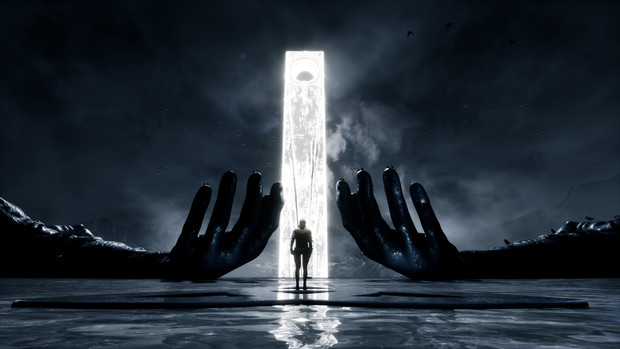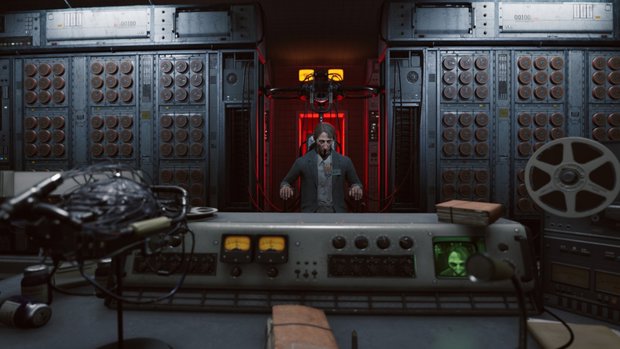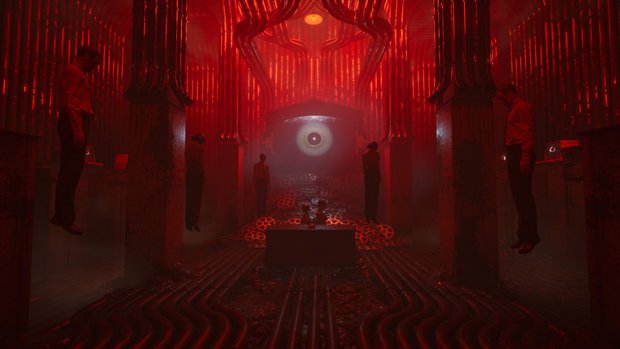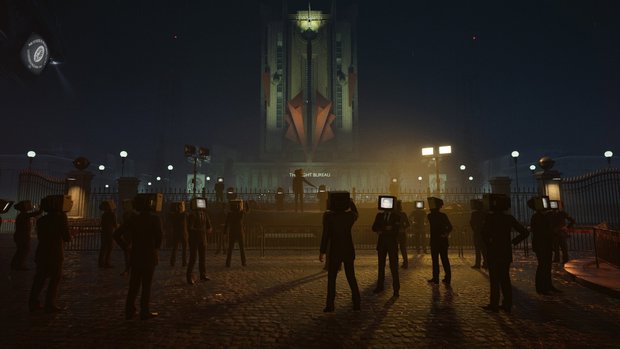KARMA: The Dark World review

- 0 Comments
Little narrative illumination but plenty of cinematic bright spots in this unapologetically bizarre psychological thriller
True story: After playing the first few hours of KARMA: The Dark World, that night I had a hazy nightmare in which nothing at all made sense but I was made to suffer one unspeakable horror or another with no means to defend myself, either physically or emotionally. Thing is, though, while my memory of it is long since gone, in terms of creepiness and flat-out weirdness, that dream had NOTHING on Pollard Studio’s psychological thriller, a dark, eerie mind-screw of a game that feels like mishmash of Orwell, Dick, Cronenberg and Lynch, with a heaping portion of The Twilight Zone and a dash of Inception or perhaps The Matrix, with the blender cranked to “WTF.” It’s not so much derivative as it is a pastiche of familiar elements, any one of which ALONE might have sent your brain spinning. Together they’re a bewildering concoction that becomes its own thing and genuinely feels like a nightmare come to life. It has a hard time finding its way, if only because it jumps whatever rails are keeping it on track long before the end. But despite its narrative overload and gameplay limitations, if this kind of name-dropping appeals to you, rest assured that even at its worst, KARMA is never not interesting.
This game got a lot of pre-release publicity, but even after watching more trailers than I could count, I still had no idea what it was all about. And now that I’ve finished it… I’m still not sure I know, and most of what I learned I can’t say anyway. But the broad strokes are as follows: You play Daniel McGovern – or ID#8490 as you’re less-than-affectionately known – a special agent of Leviathan, an ambiguous megacorporation that helped restore “hope” and order to a war-torn nation by ruling over it with an iron fist. You were recruited young following a tragedy that left you on your own as a child, and essentially brainwashed into obeying the precepts of “Mother,” the all-seeing, all-knowing AI at the center of the operation. Years later you’re now a ROAM agent for the Thought Bureau, responsible for interrogating criminal suspects by projecting yourself into their memories to experience them first-hand. Your next assignment is a man named Sean, who allegedly stole illicit information from his employer, the Leviathan-owned Winston Research Institute.
So far so relatively normal dystopian sci-fi, but things quickly take a major turn for the schizo. Not only are people’s subconscious minds fickle to begin with, you’ll begin to uncover hints of various experiments performed by Leviathan that can have serious cognitive (and worse!) consequences, conducted not just on Sean but possibly on Daniel as well. If that sounds like a spoiler, it shouldn’t because Daniel has no memories to start and it’s clear that he’s barely clinging to his few last scraps of sanity from the get-go. By the time the increasingly unhinged protagonist begins probing the mind of the psychologically unbalanced Sean, you know some crazy stuff is gonna happen because it already has been happening long before hooking yourself up. The protagonist is a quintessential unreliable narrator; since your own mind is on the fritz here, you can never be sure if what you’re seeing is even real or just a series of fantastical, often horrifying manifestations of mental instability.

And yet, it ultimately doesn’t matter much whether you’re hallucinating or not, because you’re stuck on this wild ride with no choice but to go with it. The experience is highly linear (your objectives list will rarely have more than one item on it at a time) and numerous triggers will only occur if you’ve completed the predetermined actions, even if it’s not always obvious what those are. Fortunately, it can be a whole lot of fun to let yourself be swept along. Each of KARMA’s set pieces is drastically different from the last. One minute you’ll be navigating shifting hallways with moving zigzag floors and encroaching black goo becoming more and more threatening; the next you’re crawling through cobwebbed, mote-filled dingy ductwork; and then suddenly you’re in a looping, faux-50s home with mannequins playing out a gut-wrenching family crisis. Keep going and you’ll encounter twisted versions of bureaucratic torment, and even an abstract representation of an unlikely romance, depending on whose memories you’re exploring. As Daniel’s own memories begin creeping back in around the edges, you’ll also relive flashbacks in both “real” and terrifying nightmare forms.
It’s all compelling stuff, some scenes more frightening than others. I was expecting a horror game and for the first several hours that’s pretty much exactly what I got, with a fair bit of skulking around dimly lit areas as increasingly disturbing imagery enveloped me. A few jump scares deliver a jolt, but for the most part the game is intent on filling you with an oppressive existential dread. The first-person 3D graphics really help sell it, with impressive use of both lighting and colour to distinguish each section, from blood-red rooms of suspended mannequins and giant eyeballs, to a garish yellow office environment filled with inexplicably arranged TVs, to the eerily blue limbo realm that serves as a hub to people’s memories. It’s often highly cinematic, and periodically the screen will shake or display other distortions to denote a worsening mental condition, which thankfully never lasts long. The more “normal” scenes are uniquely designed with a retrofuturistic aesthetic befitting the game’s alternate history 1984(ish) East German setting, which still uses clunky computers and pneumatic tubes for communication despite its advanced brain dive technology.
The soundscape, too, does a great job of keeping you on edge. A variety of musical styles are used to suit the circumstances, whether from chilling violin stings, discordant hums and booms, or sweeping orchestral arrangements for the most frenetic moments. In between, long stretches of silence are broken up only by creepy whispers or growled threats, your own context-sensitive footfall, or unskippable vocal interjections by the main characters. The British voice-overs are excellent across the board, and the actors are called on to do a LOT of hard emoting as the stress and traumas take their toll. My only complaint is that the actors for Daniel and Sean sound so alike when excited that I had trouble distinguishing them during the latter’s mind probes. You see neither character during these sequences but hear both periodically, and when you can’t fully trust your eyes and ears to begin with, it’s even harder to figure out whose desperate cries, panicked pleas and mournful wails you’re hearing at any given time.

At some point, however, KARMA seems to remember it has a story to tell beyond just the waking nightmare you’ve been experiencing to that point. Which is good, because the first half of the game may be deliciously macabre, but it’s so relentlessly tense and mystifying that the story never really has a chance to breathe. It doesn’t get any less weird after that, and there are still a few intensely unsettling scenarios still to come, but the emphasis on horror does lessen somewhat. In its place is a greater sense of mystery as you try to piece together what Leviathan is up to and how it all relates back to you and your lost memories of a tragic past. The problem is that it realizes this too late, or rather that there isn’t enough time left to do the change of focus justice.
The entire game took me less than six hours to complete, and the breakneck pace of its linear progression doesn’t suit the broader narrative nearly as well as the haunted funhouse feel of the first half. There’s both too much and too little exposition crammed into not nearly enough time and space after that, relying heavily on scattered notes and memos or cassette recordings to do most of the heavy lifting. As a result, some important questions are answered without really feeling earned, while other massive plot holes are left unfilled altogether. The extended endgame, while fascinating, arrives out of the blue and wraps things up in a way that’s as confounding as it is rushed. (A post-credits epilogue is actually far more enlightening than the previous supposed denouement.) There is SO much packed into this world that the story could easily have supported double the play time without any padding.
As it is, KARMA could stand to have some padding in terms of gameplay. There isn’t really a whole lot to actually do for much of the game except guide Daniel (or his memory surrogates) through yet another anguish. This can be done either with the mouse/keyboard or gamepad, both of which work perfectly well, though the handful of motion-control activities like opening doors and drawers feel cumbersome and entirely pointless no matter which method you use. Hotspots are fairly few and far between, highlighted automatically when you draw near enough. Some items you can pick up for a closer look (or more often, read), rotating them in your hands without much benefit. There are only ever a few inventory items to collect at any one time and it’s obvious where they need to be used. Though they aren’t used automatically, the inventory will open on its own for the appropriate hotspot, whether or not you have the required solution.
There are a handful of other puzzles to solve as well, mostly involving passwords with clues found nearby. Several obstacles involve paying attention to patterns and/or time, most of them routine but occasionally quite clever. One intriguing level has you finding and eliminating an increasing number of hidden other-dimensional anomalies. There is also a recurring series of standalone puzzle boxes to solve by completing different sequences, with only one chance to get them right, but these are entirely optional to earn collectible mementos.

There is a survival element to deal with, but it’s limited to specific monster encounters so you’re otherwise free to play at your leisure. (Not that either the pace or the atmosphere affords much leisure.) A few short chase sequences aren’t very difficult but can trip you up with sudden shifts in the environment, though it’s rather wickedly fun to get caught anyway just to see your stalking terror up close. (Autosave checkpoints right beforehand ensure you never have to repeat much.) These parts could and should have been panic-inducing, but what makes them almost laughable is how agonizingly slow Daniel is. Even the “run” option is barely a normal walking speed, so the chases feel like they’re practically in slow motion. Which, come to think of it, IS rather dream-like but probably not the intended aim here. A couple other skin-crawling “action” set pieces are much better implemented, requiring a degree of strategy and stealth to succeed, but both occur only once.
KARMA is not a game that would have benefited from more random challenges, but a more thorough investigative mechanic would have made the mystery you’re trying to solve feel much more immersive, along with the world in which it’s set. The environment is practically begging to be explored more. For no particularly apparent reason, it is heavily influenced by Nineteen Eighty-Four, complete with Big Brother-like oversight, old-school telescreens, and endless propaganda posters lining dilapidated alleyways. It’s not a subtle influence either, as the book itself is prominently featured in several scenes, and its themes factor into some puzzles. But why? As an homage to George Orwell, fair enough, but it really doesn’t add anything to the central mystery, just another layer of superficial absurdity in an already outlandish environment.
Two scenes in particular feel especially Orwellian. There’s a banal one invoking the horrors of modern office drudgery and corporate tyranny, as well as an entire standalone sequence depicting one woman’s search for love and liberty, which is so different from anything else that it practically feels like it belongs in another game. The graphics themselves change completely in style to something more cartoony and abstract, with gameplay more akin to light aerial maneuvering. It’s well done, just feels a little out of place in a game that’s so single-minded otherwise.
Some Blade Runner-esque inspirations creep in from time to time too, with computerized psych evaluations that fall just short of being called Voight-Kampff. And yet for all its knowing allusions, I never did figure out why every non-essential NPC had a boxy TV for a head. As for the aforementioned Inception/Matrix references, I don’t dare say much, except that it’s hard to ever be sure which reality you’re truly inhabiting. There simply isn’t much to learn beyond what the game spoon feeds you, leaving everything else totally open to interpretation without much information to work with.
Final Verdict
A wholehearted embrace of the strange is at the heart of KARMA: The Dark World. If you’re into odd, creepy experiences that don’t make much sense but really don’t need to for having a good time, chances are you’ll do precisely that here. If you demand more narrative coherence in your stories, or better-balanced gameplay to uncover mysteries for yourself, you’ll likely come away wishing this game was a little more grounded in tangible reality instead of sacrificing so much at the altar of weirdness, including any emotional attachment to the main character. The finale wants so much to tug at one’s heartstrings, but there just isn’t enough connection to really feel its poignancy. So, a perfect game this is not. But it’s often an entertaining mess, and what it does well, it does very well. I’m certainly glad I played it, while sincerely hoping the developers build on what they’ve established here, returning with a new creation that’s even better next time.
Hot take
A bewildering story is content to leave players floundering in the dark, but KARMA’s commitment to nonstop weirdness provides some gloriously unhinged nightmare fuel.
Pros
- Variety of haunting environments keeps you on edge
- Excellent voice acting
- Highly cinematic presentation
- Brisk pace keeps things fresh
Cons
- Multilayered story too tangled in unreality for its own good
- Not much investigative gameplay to uncover the mystery yourself
- Rushed ending leaves many questions unanswered
Jack played KARMA: The Dark World on PC using a review code provided by the game's publisher.











0 Comments
Want to join the discussion? Leave a comment as guest, sign in or register in our forums.
Leave a comment